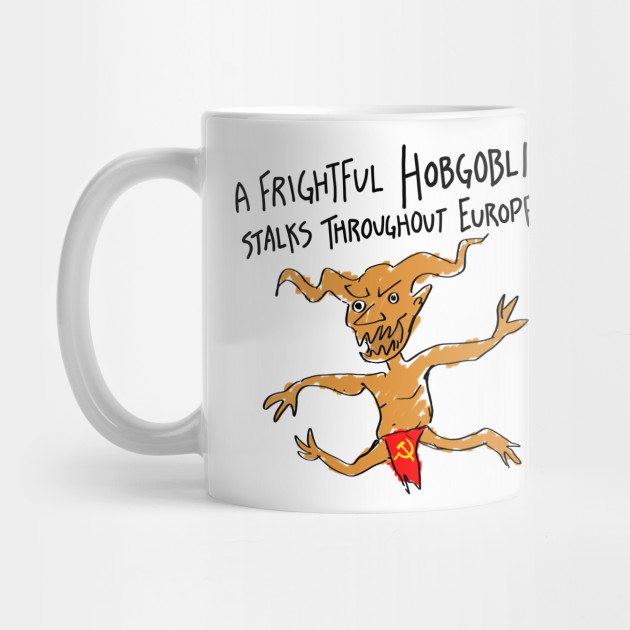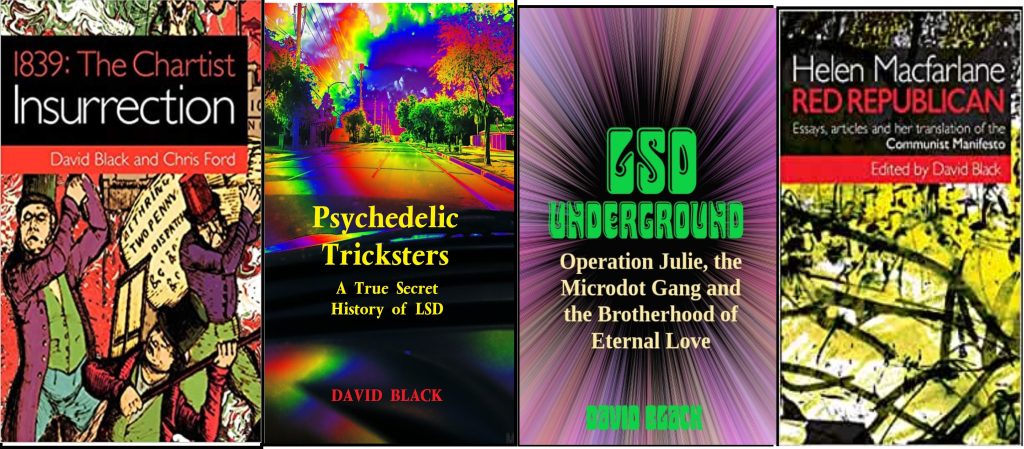
David Black
21 July 2023
Terry Eagleton, writes in his review of Marx’s Literary Style by Ludovico Silva (London Review of Books, 29 June 2023): “The Communist Manifesto is rife with arresting imagery from the moment of its celebrated opening: ‘A spectre is haunting Europe.’” In Marx’s writings, “the categories that spring to his mind are comedy, tragedy, farce, bathos, epic, parody, spectacle and so on. If drama is latently political, politics is inescapably theatrical.”
In response, David Ireland writes in a letter to the LRB:
“Helen Macfarlane, the Scottish Chartist who in 1850 issued the first English language translation of the Manifesto, is widely derided for her rendering of ‘ein Gespenst’ [a spectre’] as ‘a frightful hobgoblin.’ It was at least a variation on the spectre.”
As the author of a prospective biography of Helen Macfarlane – described by Karl Marx as a “rara avis” with uniquely “original ideas” -, I question the derision. Today ‘hobgoblin’ is associated with the comedy cartoon figure on the label of Hobgoblin beer; or by the minor Marvel Comics super-villain. In 1850, however, ‘hobgoblin’ had other associations and was well-established literary currency.
According to historian, Peter Linebaugh:
‘“Hob” was the name of a country labourer, ‘goblin’ a mischievous sprite. Thus communism manifested itself in the Manifesto in the discourse of the agrarian commons; the substrate of the language revealing the imprint of the clouted shoon in the sixteenth century who fought to have all things in common. The trajectory from commons to communism can be cast as passage from past to future’.
Fascinating as Linebaugh’s idea of hobgoblins as belonging to the historical imaginary of the daily world of peasant communing is, it is hard to validate according to the historical sources.
Although Macfarlane renders Gespenst as ‘hobgoblin’ in the opening lines, she uses ‘bugbear’ for the same word a few lines later, referring to “silly fables about ‘the bugbear of Communism’”. In Scottish folklore, according to the Dictionary of the Older Scots Tongue, the ‘Bogle’ is ‘A supernatural being of an ugly or terrifying aspect; a bugbear’.
That ‘Hobgoblin’ is interchangeable with ‘bugbear’ is indicated in a 1593 statement from a government informer about 1593 concerning playwright Christopher Marlowe, shortly before he was stabbed to death in a Deptford ale-house: ‘into every Company he [Marlowe] Cometh he persuades men to Atheism willing them not to be afeard of bugbeares and hobgoblins, and utterly scorning both god and his ministers’.
As this statement was only discovered in the early 20th century there is no way Helen Macfarlane would have known about it. But clearly her translation of hobgoblin and bugbear as the spectre of communism expresses a same ‘spirit’ as Marlowe on atheism.
In 1684 John Bunyan’s ‘Who Would True Valour See’, in The Pilgrim’s Progress, has ‘Hobgoblin, nor foul Fiend/Can daunt his Spirit/He knows, he at the end/Shall Life Inherit’. In Jeremy Bentham’s chapter in the Book of Fallacies (published in 1824), entitled ‘The Hobgoblin Argument, or, No Innovation’:
‘The hobgoblin, the eventual appearance of which is denounced by this argument, is anarchy, which tremendous spectre has for its forerunner innovation… Of a similar nature and productive of similar effects is the political device here exposed to view…’
In the 1846 essay, ‘Self-Reliance’, by the American Transcendentalist, Ralph Waldo Emerson the device reappears:
‘In your metaphysics you have denied personality to the Deity: yet when the devout motions of the soul come, yield to them heart and life, though they should clothe God with shape and color. Leave your theory, as Joseph his coat in the hand of the harlot, and flee. A foolish consistency is the hobgoblin of little minds, adored by little statesmen and philosophers and divines’.
As Helen Macfarlane quotes Emerson in her own writings, it is likely, if not evident, that Emerson’s use of ‘hobgoblin’ influenced her translation of the Communist Manifesto.
(Red Republican: the Complete Annotated Works of Helen Macfarlane, edited and introduced by David Black, was published by Unkant in 2014)

